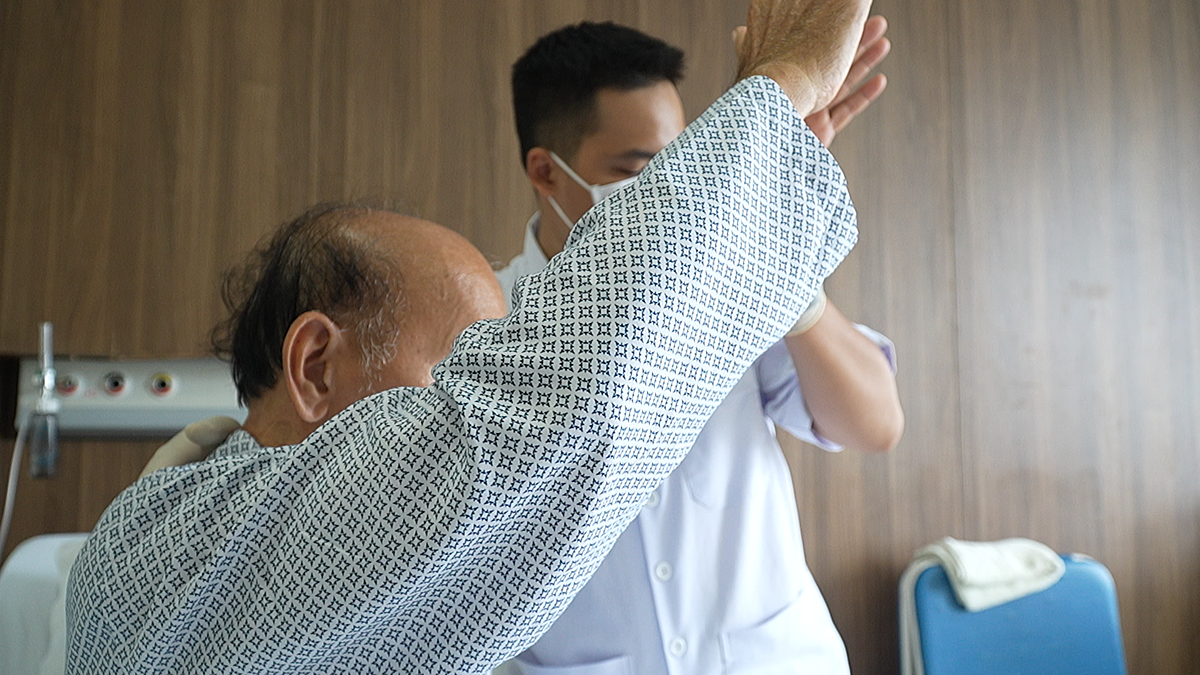On 20/8, Doctor Pham Thai Ngoc Long from the Emergency Department of 175 Military Hospital, recounted arriving at the scene with nurse Le Thanh Binh after receiving a dispatch from Ho Chi Minh City’s 115 Emergency Center. A young man was performing continuous chest compressions on an unconscious elderly man on the tennis court, guided remotely by the emergency operator. The patient was cyanotic, with no palpable pulse and an erratic heartbeat, likely due to a severe arrhythmia, specifically pulseless electrical activity (PEA), requiring advanced treatment at the hospital.
Doctor Long and nurse Binh took turns performing CPR while quickly transferring the patient to the ambulance. Throughout the journey, they continued CPR and provided assisted ventilation, administering three doses of adrenaline, a crucial medication for cardiac arrest.
Upon arrival at the emergency room, the medical team continued resuscitation efforts with advanced life support protocols, including defibrillation, intubation, and circulatory stabilization. Despite repeated defibrillation attempts and maximum doses of resuscitation medication, the patient's ventricular fibrillation persisted.
CPR guidelines suggest that if spontaneous circulation doesn't return after 30 minutes of continuous CPR, discontinuation of resuscitation may be considered. Most individuals would not survive such intense ventricular fibrillation, leading to sudden cardiac arrest and death. However, thanks to his good physical condition and regular exercise, the patient's heart continued its erratic rhythm. This motivated the team to persist. After nearly 45 minutes and approximately 10 defibrillation attempts, the patient's heart finally regained a stable rhythm.
"After the resuscitation, my shirt was drenched in sweat, and my arms were so tired I couldn't even type up the patient's records," Doctor Long said.
 |
The patient exercising after being weaned off the ventilator at 175 Military Hospital. Photo: Hospital provided |
The patient exercising after being weaned off the ventilator at 175 Military Hospital. Photo: Hospital provided
Following stabilization, the patient underwent a comprehensive assessment to evaluate cardiovascular damage, the extent of heart failure, and potential pulmonary edema resulting from the cardiac arrest. Fortunately, thanks to the prompt CPR, the period of oxygen deprivation was short, preventing significant brain damage or multi-organ failure. However, an angiogram revealed severe blockages in all three coronary arteries, including a complete blockage of the left coronary artery, requiring emergency stent placement.
The 74-year-old patient, a dual citizen of Malaysia and Singapore, had lived in Vietnam for several years. The life-threatening event was triggered by a malignant arrhythmia, which can occur unexpectedly. Furthermore, he had been engaging in continuous strenuous physical activity despite experiencing fatigue and sleep deprivation the previous night.
Post-stent placement, the patient was transferred to the intensive care unit for further treatment, including therapeutic hypothermia, brain protection, and continuous renal replacement therapy to remove cytokines and support multi-organ function. He gradually recovered, making a remarkable recovery. Initially discouraged by his weakness and limited mobility, he regained strength with encouragement from doctors and family, overcoming the critical phase and stabilizing.
"This is the most memorable case and the longest CPR I've performed during my time in emergency medicine. I hope I won't encounter a longer one in the future," Doctor Long shared.
 |
Doctor Pham Thai Ngoc Long treating a patient in the Emergency Department of 175 Military Hospital. Photo: Quynh Tran |
Doctor Pham Thai Ngoc Long treating a patient in the Emergency Department of 175 Military Hospital. Photo: Quynh Tran
Lieutenant Colonel, MSc, Specialist Doctor 1 Diep Hong Khang, Deputy Head of the Intensive Care Unit, considered this a rare case of successful resuscitation after a prolonged out-of-hospital cardiac arrest. He attributed the success to the close interdisciplinary collaboration between emergency medicine, interventional cardiology, intensive care, and rehabilitation. This comprehensive treatment model significantly increases survival rates and minimizes brain damage.
Recently, the hospital has saved six lives after out-of-hospital cardiac arrests lasting 10 to 35 minutes. The primary causes were ventricular arrhythmias and acute myocardial infarctions. Patients who receive prompt CPR at the scene tend to recover more quickly, even after extended periods of cardiac arrest. Conversely, those without pre-hospital care require longer resuscitation and face higher risks of complications.
Doctors recommend regular check-ups for individuals over 60 or with heart conditions, adherence to treatment plans, and moderate exercise. Families are also encouraged to learn CPR techniques to utilize the critical "golden time" in emergencies.
Le Phuong












